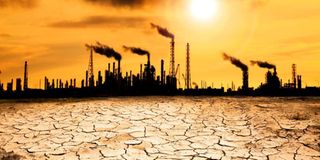Post-Covid recovery plans to drive up carbon emissions

Post-Covid recovery plans could drive emissions up, higher than was anticipated.
What you need to know:
- Instead of reduced fossil fuel production in agreement with the Paris Agreement targets, the production will go up.
- The world's biggest economies plan to produce double the amount of coal, fossil fuel and gas by 2030.
- Despite Africa producing very little of the global emissions, the impact of global warming and climate change is huge.
The air was cleaner, and probably cooler early this year as Covid-19 continued to devastate the world. For a second, many climate change campaigners thought the Covid-19 pandemic was a blessing in disguise.
Factories stopped roaring and automobiles switched off their engines- there was reduced emission, not only of greenhouse gases, but of air pollutants.
And now, post-Covid recovery plans could drive emissions up, higher than was anticipated as governments ramp up efforts to revive their ailing economies.
Despite many countries, including Kenya, having ratified the Paris Agreement, plans and measures which had been drafted by governments even before Covid-19 pointed to growing fossil fuel production globally, indicating growing greenhouse gases.
“Pre-Covid plans and post-Covid stimulus measures point to a continuation of the growing global fossil fuel production gap, locking in severe climate disruption,” states the Gap report.
Projections released last week by the United Nations Environment Programme (Unep) show that instead of reduced fossil fuel production in agreement with the Paris Agreement targets, the production will go up, and Covid-19 may make a bleak situation worse.
According to the Paris Agreement, countries are supposed to keep emissions low so as to attain a target of below two degrees Celsius above pre-industrial levels during this century, and even further to 1.5 degrees Celsius so as to curb global warming.
But the world biggest economies plan to produce double the amount of coal, fossil fuel and gas by 2030 than what would limit global warming, according to research findings published by the Unep.
These include the United States of America, China and India.
The report states that between 2020 and 2030, the global coal, oil, and gas production would have to decline annually by 11 per cent, four per cent, and three percent, respectively so as to be consistent with a 1.5°C pathway.
Diversify economies
“But government plans and projections indicate an average two per cent annual increase for each fuel. This gap is large, with countries aiming to produce 120 per cent more fossil fuels by 2030 than would be consistent with limiting global warming to 1.5C,” states the report.
Unfortunately, as of November 2020, G20 governments had committed USD 233 billion to activities that support fossil fuel production and consumption (e.g. for airlines, car manufacturers, and fossil-based power consumers), as compared with US$146 billion to renewable energy, energy efficiency, and low-carbon alternatives such as cycling and pedestrian systems, states the report.
According to the UN body, coal, oil, and gas account for over three-fourths of global greenhouse gas (GHG) emissions, including 90 per cent of carbon dioxide emissions and roughly a third of methane emissions.
The United Nations Secretary-General António Guterres said, “Governments must work on diversifying their economies and supporting workers, including through Covid-19 recovery plans that do not lock in unsustainable fossil fuel pathways but instead share the benefits of green and sustainable recoveries. We can and must recover better together.”
Despite Africa producing very little of the global emissions, the impact of global warming and climate change is huge.



